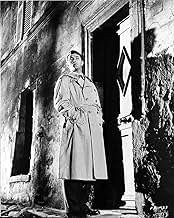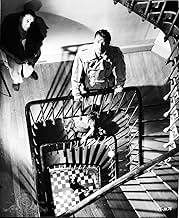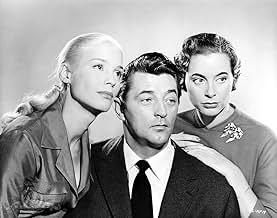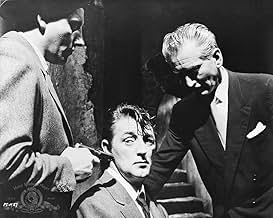IMDb RATING
6.0/10
1.6K
YOUR RATING
When a reclusive, enigmatic millionaire dies suddenly on the Riviera, his press agent begins to investigate his employer's shady past.When a reclusive, enigmatic millionaire dies suddenly on the Riviera, his press agent begins to investigate his employer's shady past.When a reclusive, enigmatic millionaire dies suddenly on the Riviera, his press agent begins to investigate his employer's shady past.
Ingrid Thulin
- Brita
- (as Ingrid Tulean)
Frédéric O'Brady
- Spring
- (as Frederick O'Brady)
Lily Kann
- Blind Housekeeper
- (as Lilly Kann)
Featured reviews
I first saw this film as a young boy, and then for years it could not be seen on television, or for that mater anywhere else. I saw the film for the last time in the early 70's, until it was released again early again in this century.
Others have gone into the plot of this film, and I will not do that. What is interesting for me is that the plot of the story is interesting, and it has one of the most unusual ending of any film made in the 1950's. Also while some have criticized Mitchums performance and if he is walking through this film, I think he plays it just right, a man of cool. Ela Fitzgerald once commented that she liked the way Mitchum walked. During the open sequence we see him, I am sure she is referring to this film. Watching him, you realize that if the opportunity had come, and he had wanted to, he could have been the American equivalent to James Bond. Perhaps he could have played the character that Dean Martin would play of Matt Helm, and in films that would have been more in keeping with the books. He really carries this film. His performance reminds me a little of the character he played in OUT OF THE PAST, a wiser Jeff Bailey perhaps.
I see parallels with MR. ARKADIN and THE THIRD MAN, it really tries to be the latter, though does not succeed. It does have the classic look of the film noir, darkness with light shinning through certain areas of the frame, unusual for a color film of the time, and can be quite enjoyable to watch. Also the traces of the Noir film come immediately through when he informs his employers sexy young wife that she now has to become the grieving widow.
Eastman color, while cheaper than the original Technicolor, does have a tendency to fade over time. When I first saw this film in color, it was rather gorgeous to look at. Perhaps the comment about the horrible Eastman color is due to the fading of these prints.
If you liked Robert Mitchum in other films, I highly recommend this film just to see him. Without him the film would not be worth seeing at all.
Others have gone into the plot of this film, and I will not do that. What is interesting for me is that the plot of the story is interesting, and it has one of the most unusual ending of any film made in the 1950's. Also while some have criticized Mitchums performance and if he is walking through this film, I think he plays it just right, a man of cool. Ela Fitzgerald once commented that she liked the way Mitchum walked. During the open sequence we see him, I am sure she is referring to this film. Watching him, you realize that if the opportunity had come, and he had wanted to, he could have been the American equivalent to James Bond. Perhaps he could have played the character that Dean Martin would play of Matt Helm, and in films that would have been more in keeping with the books. He really carries this film. His performance reminds me a little of the character he played in OUT OF THE PAST, a wiser Jeff Bailey perhaps.
I see parallels with MR. ARKADIN and THE THIRD MAN, it really tries to be the latter, though does not succeed. It does have the classic look of the film noir, darkness with light shinning through certain areas of the frame, unusual for a color film of the time, and can be quite enjoyable to watch. Also the traces of the Noir film come immediately through when he informs his employers sexy young wife that she now has to become the grieving widow.
Eastman color, while cheaper than the original Technicolor, does have a tendency to fade over time. When I first saw this film in color, it was rather gorgeous to look at. Perhaps the comment about the horrible Eastman color is due to the fading of these prints.
If you liked Robert Mitchum in other films, I highly recommend this film just to see him. Without him the film would not be worth seeing at all.
This is my idea, as a writer, of a great ethical mystery. The intelligent narrative tells the story of an American working for a mysterious and very wealthy man named Victor Danemore. One day at his estate on the French Riviera, the great man, played by Jean Galland, dies. Robert Mitchum as Dave, the assistant, goes to the man's wife, lovely Genevive Page, for information; she knows nothing either. His odyssey to try to find out what he needs to know about his mysterious employer leads him to Vienna and to Stockholm--and finally to the fact that Danemore had been blackmailing Nazi collaborators who were afraid their wartime crimes would be discovered. At the end, having been saved narrowly from the bad guys, who are actually good guys testing his ethics, he goes off to seek out the real ex-Nazi collaborator bad guys in as many countries as he must; by then the lovely young woman he has fallen in love with, Ingrid Thulin (brilliant as always) is going to be waiting for him. This is a project conceived by Sheldon Reynolds, who wrote the script along with Gene Levitt and Harold Jack Bloom and also directed this fascinating movie. He was also the mind behind another Euro-American on-location project, "Dateline:Europe", one of the best half-hour TV series of all time,one which utilized (as this feature movie) does European technicians, actors, locations and artists. (When people talk about " the sorts of movies 'they' used to make and don't or can't any more", this is the sort of international, intelligent, adult and well-scripted film to which the disappointed are referring). The music here by Paul Durand is good, the cinematography by Bertil Palmgren frequently stunning. The piece also has many actors in small but telling parts, including Inga Tingblad as Thulin's mother, George Hubert, Frederick Schreidler, etc. They are all professional and exactly right for their parts; and all the parts contribute to a whole that moves with the inexorability of a tide toward a satisfying climax and an unforgettable ending. A personal favorite.
Foreign Intrigue (1956)
An underrated transition film, a low budget affair that is pure European color and style. Visually, it almost presages the Euro-American "Charade" which was decidedly more up budget. Here, the director, an unknown Sheldon Reynolds, takes advantage of all the empty spaces and long pauses the pace required. The lighting is flat, almost anti-noir, with widescreen grandness and yet an oddly impersonal intimacy. Not to be contradictory--the scenes are generally quiet, with close conversations, but everything is filmed from a certain, and constant, distance.
It is this steady, quiet pace that makes the film work. And Robert Mitchum. He needs no explanation. The first of the two or three main women he connects with is a bit false, but the main one is a caricature of the Nordic beauty, and with sincere energy and charm. At times it really does look like she is smiling at Mitchum, not his character, as if she can't believe she's touring Stockholm, etc., with this famous man, and the movie gets away with it. Mitchum for his part keeps his cool, except for the necessary fist fight once or twice.
It's 1956, and international intrigues like this are slowly rising into a genre of their own. People come and go, scenes are not what they seem at first, people have false identities and foreign accents. The big theme (too big to believe, but that's okay, it's supposed to be) is that realignment of global power after WWII. The real thing, made up of shadowy individuals who seem to be above nationality, and only know about intrigue, money, and winning at any cost.
I don't want to pump this up too much. It's slow at times, and the acting not always right on. The effects (the atmosphere, the fights, etc) are sometimes so archly false you can't quite accept it even as theatrical, but just a cheap. But that's the exception. Fall into the pace of it and it's not bad at all.
An underrated transition film, a low budget affair that is pure European color and style. Visually, it almost presages the Euro-American "Charade" which was decidedly more up budget. Here, the director, an unknown Sheldon Reynolds, takes advantage of all the empty spaces and long pauses the pace required. The lighting is flat, almost anti-noir, with widescreen grandness and yet an oddly impersonal intimacy. Not to be contradictory--the scenes are generally quiet, with close conversations, but everything is filmed from a certain, and constant, distance.
It is this steady, quiet pace that makes the film work. And Robert Mitchum. He needs no explanation. The first of the two or three main women he connects with is a bit false, but the main one is a caricature of the Nordic beauty, and with sincere energy and charm. At times it really does look like she is smiling at Mitchum, not his character, as if she can't believe she's touring Stockholm, etc., with this famous man, and the movie gets away with it. Mitchum for his part keeps his cool, except for the necessary fist fight once or twice.
It's 1956, and international intrigues like this are slowly rising into a genre of their own. People come and go, scenes are not what they seem at first, people have false identities and foreign accents. The big theme (too big to believe, but that's okay, it's supposed to be) is that realignment of global power after WWII. The real thing, made up of shadowy individuals who seem to be above nationality, and only know about intrigue, money, and winning at any cost.
I don't want to pump this up too much. It's slow at times, and the acting not always right on. The effects (the atmosphere, the fights, etc) are sometimes so archly false you can't quite accept it even as theatrical, but just a cheap. But that's the exception. Fall into the pace of it and it's not bad at all.
The musical score almost makes it unwatchable. The same transition music throughout the film consists of a tom-tom and Gilligan knocking on a coconut with two wooden dowels. It's enough to cause a coma. That being said, the rest of the film's attributes out-weigh the migraine-inducing music.
Mitchum is classic, using his debonair best to woo admirers of his old-school, Hitchcockian style. (Wonder why Hitchcock never really used him?)
The cinematography uses the 1956 color like an oil painting, still incorporating the contrast and shadows of a black and white noir classic.
It's worth a watch.
Mitchum is classic, using his debonair best to woo admirers of his old-school, Hitchcockian style. (Wonder why Hitchcock never really used him?)
The cinematography uses the 1956 color like an oil painting, still incorporating the contrast and shadows of a black and white noir classic.
It's worth a watch.
"Foreign Intrigue," a 1956 film starring Robert Mitchum, starts out promisingly enough and peters out. Despite filming in color in France, Sweden, and Monaco, even the film's beauty can't overcome its slow pace and dull script.
Mitchum plays Dave Bishop, who works for an international man of mystery, Victor Danemore. Danemore dies of a heart attack suddenly, and Bishop wonders why every single person he encounters wants to know if Danemore said anything before he died.
Even after working for him, Bishop doesn't know much about him, but he endeavors to find out. He learns that Danemore went to Vienna once a year and goes there.
Danemore's home there is in a slum, his housekeeper is blind, and can only supply him with one name, Olaf Lindquist from Sweden. Bishop finds Lindquist's home, but the man himself is dead.
Bishop and Lindquist's beautiful daughter Brita (Ingrid Thulin) fall for one another; meanwhile, it's obvious her mother is keeping a secret.
Soon Bishop finds himself being followed by one man, Spring (Frederic O'Brady) who won't tell him who he works for, bad-mouthed by Danemore's widow (Genevieve Page) to Brita and her mother, and approached by a group of men who want the names of the men Danemore met yearly in Vienna.
First of all, despite compliments on the music, it was totally overbearing, not to mention loud and intrusive. If you liked it, fine, it was just too over the top for me.
Secondly, this film took way too long to make its point. In the beginning, it was intriguing, but then it began to drag.
Thirdly, we think we're going to find something out and guess what, after all this, we don't.
Robert Mitchum is laid-back and sexy as usual - in this instance, I can't tell if his persona helped the movie or hurt it. He was always a very deliberate actor and perfect for noir - I realize some people call this a noir, and perhaps it was, but the payoff just wasn't there.
It's hard for me to imagine Mitchum hurting a film - I think in this case, I'll have to blame the script and the fact that some time could have been edited out.
Promising start - disappointing finish - pretty to look at.
Mitchum plays Dave Bishop, who works for an international man of mystery, Victor Danemore. Danemore dies of a heart attack suddenly, and Bishop wonders why every single person he encounters wants to know if Danemore said anything before he died.
Even after working for him, Bishop doesn't know much about him, but he endeavors to find out. He learns that Danemore went to Vienna once a year and goes there.
Danemore's home there is in a slum, his housekeeper is blind, and can only supply him with one name, Olaf Lindquist from Sweden. Bishop finds Lindquist's home, but the man himself is dead.
Bishop and Lindquist's beautiful daughter Brita (Ingrid Thulin) fall for one another; meanwhile, it's obvious her mother is keeping a secret.
Soon Bishop finds himself being followed by one man, Spring (Frederic O'Brady) who won't tell him who he works for, bad-mouthed by Danemore's widow (Genevieve Page) to Brita and her mother, and approached by a group of men who want the names of the men Danemore met yearly in Vienna.
First of all, despite compliments on the music, it was totally overbearing, not to mention loud and intrusive. If you liked it, fine, it was just too over the top for me.
Secondly, this film took way too long to make its point. In the beginning, it was intriguing, but then it began to drag.
Thirdly, we think we're going to find something out and guess what, after all this, we don't.
Robert Mitchum is laid-back and sexy as usual - in this instance, I can't tell if his persona helped the movie or hurt it. He was always a very deliberate actor and perfect for noir - I realize some people call this a noir, and perhaps it was, but the payoff just wasn't there.
It's hard for me to imagine Mitchum hurting a film - I think in this case, I'll have to blame the script and the fact that some time could have been edited out.
Promising start - disappointing finish - pretty to look at.
Did you know
- TriviaAround 53 minutes into the film on the veranda in a romantic scene with a beautiful Swedish woman, a rather large bee flies into the scene and flies right between them. They don't break and the bee flies away.
- GoofsAt about 7 minutes into the movie Mitchum is talking to Paige who is sunning herself at the pool. She tells him to throw her robe to her but when she puts it on, she is actually wearing a patchwork dress.
- Quotes
Dave Bishop: Did you ever ask him who he really was?
Dominique: No.
Dave Bishop: Women are supposed to be curious... especially wives.
Dominique: Press agents are supposed to be curious.
Dave Bishop: I wasn't married to him.
Dominique: Except for the ceremony, neither was I.
- ConnectionsFollows Foreign Intrigue (1951)
- SoundtracksFOREIGN INTRIGUE CONCERTO
Music by Charlie Norman
- How long is Foreign Intrigue?Powered by Alexa
Details
- Release date
- Country of origin
- Official site
- Languages
- Also known as
- Die fünfte Kolonne
- Filming locations
- Production companies
- See more company credits at IMDbPro
Box office
- Budget
- $625,000 (estimated)
- Runtime1 hour 40 minutes
- Aspect ratio
- 1.85 : 1
Contribute to this page
Suggest an edit or add missing content































